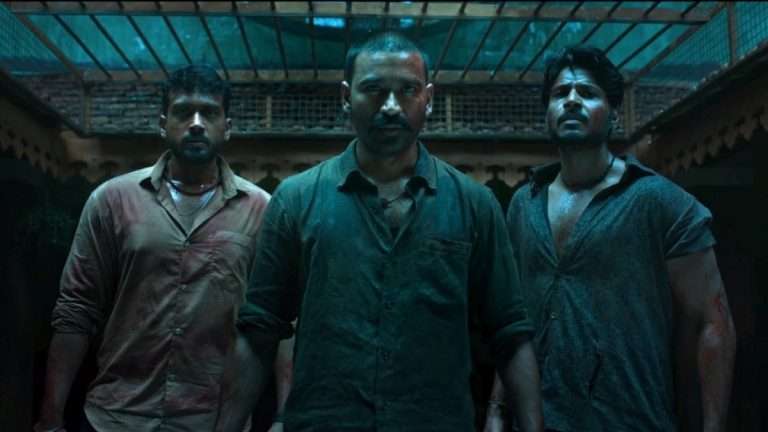If it’s been suggested that the phrase “based on a true story” has been overused as a selling point, then there is no subgenre of biopics more derivative than that of the inspirational sports story. The parallels between an athlete’s life both in and apart from their arena of competition have been explored extensively throughout the history of sports cinema, and even the most interesting historical figures can have their lives rendered feckless as a result of formulaic narratives.
Thankfully, Kristen Stewart’s inventive directorial debut, “The Chronology of Water,” has no concerns about regurgitating cliches, as at times its intimacy is intentionally uncomfortable. Although it’s a faithful accounting of an extraordinary true story, Stewart’s adaptation uses the basis of Lidia Yuknavitch’s autobiography to form a mythic, intoxicating study of rebirth, exploration, and healing.
While it’s centered around the life of Lidia Yuknavitch, a highly decorated swimmer who nearly competed in the 1980 Olympics before the United States boycotted the Moscow games, “The Chronology of Water” is told in a non-linear fashion that features fragmented memories from its troubled protagonist. Lidia, as portrayed by Imogen Poots in one of the year’s best performances, endured intense physical, emotional, and sexual abuse at the hands of her father (Michael Epp), whose obsession with her athletic success causes her to doubt the fundamentals of her adolescence.
With her mother, Dorothy (Susannah Flood) seems incapable of subverting her torment, Lidia finds tranquility within the exhilaration of competition and her individualistic path towards sexual discovery. However, Lidia’s trajectory can only go so far when she’s been denied the opportunity to be self-actualized, leading her towards a downward spiral of paranoia, addiction, and depression.

Although the swimming sequences constitute only a fraction of Lidia’s journey, Stewart finds a rhythmic degree of authenticity within the blurred vision and deep breaths required to take part in such an intense activity. This is an approach that is carried over to the rest of the film, as Lidia has perceived so much of her life in snippets. This is partially a result of her own attempts to dissuade her father’s voice, as he cruelly suggests that anything less than a full ride from a university is a sign that she is unwanted.
However, the damage Lidia suffered during her youth has also impeded her ability to form healthy relationships. Her reckless sporadicism comes to doom any friendships, romances, or bonds that become too wholesome. The dynamic Poots has with her cohort of friends, including a remarkable Esmé Creed-Miles as Claire, surges to life with youthful joy, only to be shattered by Lidia’s toxic relationship with her own well-being.
Also Read: 10 Great Films That Helped Cinema Grow As An Art Form
Stewart shows a remarkable degree of bravery in examining Lidia’s sexual discovery, as the abuse she’s suffered from her father has meant she’s formed an incongruous idea of what pleasure, intimacy, and love are supposed to look and feel like. This extends to her emotional relationships as well. The film tracks the various dead-end romances that Lidia was unable to maintain. It’s a credit to the film that each of her potential suitors feels like a well-fashioned character, and not just plot devices meant to burden Lidia with more trauma.
Although the graphic nature of Lidia’s explorations may shock more regressive audiences, they are in line with the stylistic approaches of the many decorated filmmakers Stewart has had the pleasure of working with. Although her filmmaking never feels derivative or slavishly nostalgic, Stewart’s approach has shades of David Cronenberg, Olivier Assayas, and Pablo Larraín. However, “The Chronology of Water” is also an unabashedly feminist film that makes no attempts to soften its curiosity about the female image.
Poots has been an actress who has constantly brought more to the table than she was asked, and managed to do standout work within such jam-packed ensemble films as “The Father,” “Green Room,” and “The Art of Self-Defense.” Her performance in “The Chronology of Water” is the type of immersive work that only comes when a performer truly connects with the material.
Poots has an understanding of Lidia’s journey and fragmented outlook on success that isn’t limited to her physical likeness, even if she’s entirely believable during the more intense swimming scenes. Given Poots’ adaptability and Stewart’s cryptic approach to both time and memory, it is feasible for a majority of Lidia’s adult life and adolescence to be captured by one performer, even if the young actress Anna Wittowsky is also excellent.

Poots is dominant within nearly every frame of the film, and Stewart is willing to contort and briskly navigate the camera by whatever means necessary to examine her perspective. While this means that the film’s supporting cast is called upon to play characters in the way Lidia has perceived them, Stewart’s ensemble is more than adaptable to those barriers.
Perhaps the film’s most shattering performance is from Thora Birch as Lidia’s sister, Claudia, who has grown up just as pained by abuse and offers a loving, maternal sense of protectiveness for her younger sibling. Also strong is a surprisingly excellent performance by Jim Belushi as a wistful, counter-culturist author and essayist who becomes a mentor to Lidia late in life. Belushi may have been a comedic icon in the 20th century, but he’s transformed into an exciting character actor, and “The Chronology of Water” is certainly his best work since “Twin Peaks: The Return.”
Stewart is such an audacious performer that it’s almost a surprise that it took her so long to make a directorial debut. However, it’s evident that the time was taken to learn every component of the craft, as there is a dynamic, ethereal sensibility to her approach that doesn’t feel like the work of a first-time filmmaker.
The film’s flaws, including a somewhat laborious third act that is perhaps too clear with its sentimentality, are a result of the confidence that Stewart had in making an independent production on her own terms. Despite its dizzying, overwhelming viscerality, “The Chronology of Water” has a rather simple message about willingness to take a second act. For Stewart, she may have found a second act behind the camera.








![Campus Diaries [2022] Review: A Terrible College Comedy with Worse Serious Subtext](https://79468c92.delivery.rocketcdn.me/wp-content/uploads/2022/01/Campus-Diaries-MX-Player-Review-2-768x431.png)